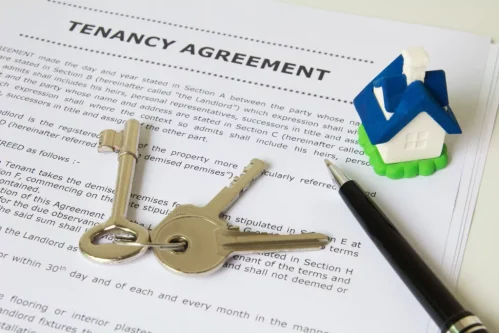Rented Property and Bankruptcy

If you live in a rented property there is nothing to stop you going bankrupt. However you may be worried about how your home will be affected.
Included in this article:
- How is your rented property affected if you go bankrupt?
- Will your Landlord be told?
- Can you move to a new rented property after going bankrupt?
- How can you move if you have a poor Credit Rating?
Rather speak to a person? Call 0800 044 3194 or click here to complete the form below and we’ll call you
How is your Rented Property affected if you go Bankrupt?
Going bankrupt can be a good way of dealing with your debts if you are renting your home. This is because your rented property is not treated as one of your assets.
There is no risk to the property itself because it is not yours. As such it is not involved in your bankruptcy in any way.
You may be worried that the negative affect on your credit rating could somehow blacklist the property. This will not happen. Only your personal credit rating will be affected.
The property you live in and the people you live with are not blacklisted if you go bankrupt.
Will your Landlord be told if you go Bankrupt?
It is very unlikely that your landlord will be told about if you go bankrupt. Normally they will only find out if you have rent arrears. They would then be a creditor and the Official Receiver would have to speak to them.
Given this the only way they are likely to find out is if you tell them or they do a new credit check on you. However it is unlikely for this to happen even if you are planning on renewing your tenancy agreement.
If you are worried about your landlord discovering your bankruptcy you could tell them yourself. Their natural reaction will be to worry about the rent and the affect on their property. However you can reassure them that there will not be a problem with these things.
If you live in England, Wales or Scotland bankruptcy is not advertised in your local newspaper. If you live in Northern Ireland it is advertised in the Friday edition of the Belfast telegraph. As such in Northern Ireland your Landlord could find out.
Can you move to a different Rented Property while Bankrupt?
There may be a number of reasons why you need to move to a new rented property while you are bankrupt. Perhaps you have changed your job or you need a different sized home.
There is nothing to stop you moving. However you will need to consider how much rent you can afford to pay. It may not be possible to rent a more expensive property unless your income is also increasing.
If you are making a payment towards your debts the Official Receiver may agree to reduce this to compensate for an increase in rent. However they will only be likely to do so in exceptional circumstances.
Any deposit you paid when you first rented your property is one of your assets. In theory it has to be paid to the Official Receiver if and when you get it back. However if you move you are allowed to use it to pay for a new deposit.
How can you overcome a Rented Property credit check?
A major issue you will face if you want to move during or after your Bankruptcy is your Credit Rating. Before you can rent a new property most private landlords will carry out a credit check against you. You are likely to fail this.
There are really only two ways you can overcome the problem. The best is usually to offer that someone will act as a guarantor for your rent payments. Most landlords will be happy if a guarantor is provided.
Another option is to pay rent in advance. Generally speaking you would need to offer at least 6 months upfront. Clearly you may not be in a position to do this.
If you are moving to a Council or Housing Association property the fact that you have a poor credit rating should not be a problem. You will not normally need to pass a credit check before you can move in.
Can you chase rent arrears on a person who is already bankrupt and the arrears come after the bankruptcy
Hi Chris
If the rent arrears have built up AFTER the date the person went bankrupt, then yes, the landlord is legally entitled to enforce repayment of these arrears. The bankruptcy only protects the person from rent arrears that existed up to the date they went bankrupt.
im a single, self employed taxi driver, I have CCJ already. I am private tenant and pay £650 per month including council tax. I I go bankrupt do you think they will let me keep this rental studio, or will they ask me to find a cheaper one?
Hi Tomas
The official receiver will normally be happy for you to stay in your current rented accommodation as long as the amount of rent you pay each month is reasonable.
In my experience, £650/mth including Council tax for a single person is reasonable. As such there should be no problem with this.
Are you thinking about going bankrupt? The process is more complicated as a self employed person especially in terms of getting your income and expenses budget right and not ending up paying more than you can afford towards your debt each month.
I would strongly recommend that you give me a call for more advice. I have an assistance service which will make the whole process much easier if you are interested.